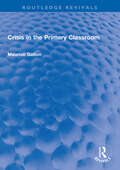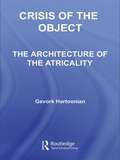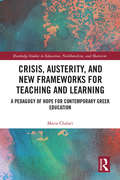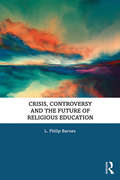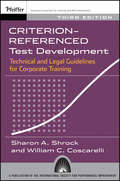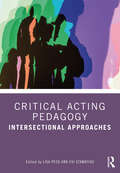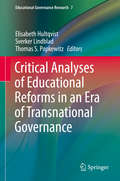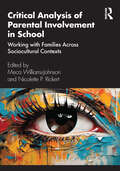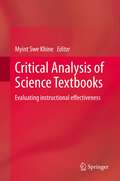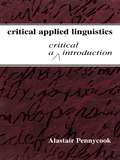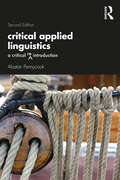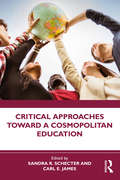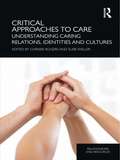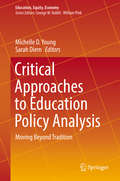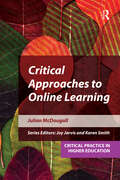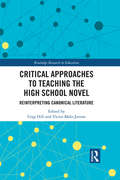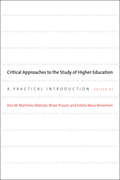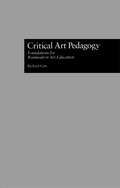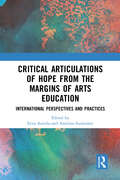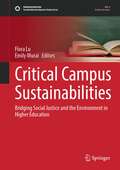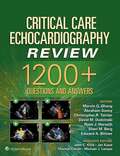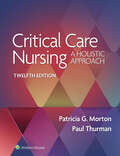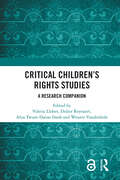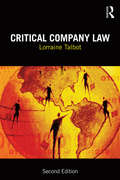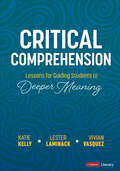- Table View
- List View
Crisis in the Primary Classroom (Routledge Revivals)
by Maurice GaltonFirst published in 1995, Crisis in the Primary Classroom redefines the crisis plaguing primary classrooms by challenging many of the educational and political orthodoxies of the nineties. The book is set during a particular period in the nineties when primary education was under attack from the Government and sections of the media, with accusations that reading standards had fallen, the National Curriculum was not being taught well and training colleges had failed to produce sufficient teachers of quality. In response to these concerns, the Government commissioned a report, which presented a series of solutions. Maurice Galton argues that the report failed to identify the root causes of the problems facing primary schools. He examines critically whether the National Curriculum was necessary, and whether teaching methods and classroom organization really needed to be changed radically. He also addresses the issue of quality among teachers, suggesting ways in which this might be developed. Crisis in the Primary Classroom deserves to be read by all concerned with the planning, administration and practice of primary education. Teachers will be encouraged by the message that methods found to be successful in the past must be accommodated in new patterns of organization and classroom practice.
Crisis of the Object: The Architecture of Theatricality
by Gevork HartoonianLooking back over the twentieth century, Hartoonian discusses the work of three major architects: Peter Eisenman, Frank Gehry and Bernard Tschumi, in reference to their theoretical positions and historicizes present architecture in the context of the ongoing secularization of the myths surrounding the traditions of nineteenth century architecture in general, and, in particular, Gottfried Semper's discourse on the tectonic. Providing a valuable contribution to the current debates surrounding architectural history and theory, this passionately written book makes valuable reading for any architect.
Crisis, Austerity, and New Frameworks for Teaching and Learning: A Pedagogy of Hope for Contemporary Greek Education (Routledge Studies in Education, Neoliberalism, and Marxism #19)
by Maria ChalariThis book attempts to examine the educational consequences of the recent social and economic situation in Greece, and it explores—on a general level—new possibilities for teaching and learning at times of national crisis. Using Greece as an exemplary case, Maria Chalari demonstrates how the relationship between neo-liberalism and education is especially salient during difficult times; it also demonstrates the effect of this relationship on teachers’ day-to-day experiences. By attending to, yet moving beyond, the negative implications of socio-economic crisis, this volume aims to present core educational values of the current era, as well as the crucial issues that may become opportunities for reflection and change.
Crisis, Controversy and the Future of Religious Education
by L. Philip BarnesCrisis, Controversy and the Future of Religious Education sets out to provide a much-needed critical examination of recent writings that consider and respond to the crisis in religious education and more widely to a crisis in non-confessional forms of religious education, wherever practised. The book is critical, wide-ranging and provocative, giving attention to a range of responses, some limited to the particular situation of religious education in England and some of wider application, for example, that of the role and significance of human rights and that of the relevance of religious studies and theology to religious education. It engages with a variety of positions and with recent influential reports that make recommendations on the future direction of religious education. Constructively, it defends both confessional and non-confessional religious education and endorses the existing right of parental withdrawal. Controversially, it concludes that the case for including non-religious worldviews in religious education, and for the introduction of a statutory, ‘objective’ national religious education curriculum for all schools, are both unconvincing on educational, philosophical and evidential grounds. Timely and captivating, this book is a must-read for religious and theological educators, RE advisers, classroom teachers, student teachers and those interested in the field of religious education.
Criterion-referenced Test Development
by Sharon A. Shrock William C. CoscarelliCriterion-Referenced Test Development is designed specifically for training professionals who need to better understand how to develop criterion-referenced tests (CRTs). This important resource offers step-by-step guidance for how to make and defend Level 2 testing decisions, how to write test questions and performance scales that match jobs, and how to show that those certified as ?masters? are truly masters. A comprehensive guide to the development and use of CRTs, the book provides information about a variety of topics, including different methods of test interpretations, test construction, item formats, test scoring, reliability and validation methods, test administration, a score reporting, as well as the legal and liability issues surrounding testing. New revisions include: Illustrative real-world examples. Issues of test security. Advice on the use of test creation software. Expanded sections on performance testing. Single administration techniques for calculating reliability. Updated legal and compliance guidelines.Order the third edition of this classic and comprehensive reference guide to the theory and practice of organizational tests today.
Critical Acting Pedagogy: Intersectional Approaches (Routledge Advances in Theatre & Performance Studies)
by Lisa Peck Evi StamatiouCritical Acting Pedagogy: Intersectional Approaches invites readers to think about pedagogy in actor training as a research field in its own right: to sit with the complex challenges, risks, and rewards of the acting studio; to recognise the shared vulnerability, courage, and love that defines our field and underpins our practices. This collection of chapters, from a diverse group of acting teachers at different points in their careers, working in conservatoires and universities, illuminates current developments in decolonising studios to foreground multiple and intersecting identities in the pedagogic exchange. In acknowledging how their positionality affects their practices and materials, 20 acting teachers from the United Kingdom, the United States, Europe, and Oceania offer practical tools for the social justice acting classroom, with rich insights for developing critical acting pedagogies. Authors test and develop research approaches, drawn from social sciences, to tackle dominant ideologies in organisation, curriculum, and methodologies of actor training.This collection frames current efforts to promote equality, diversity, and inclusivity in the studio. It contributes to the collective movement to improve current educational practice in acting, prioritising well-being, and centering the student experience.
Critical Analyses of Educational Reforms in an Era of Transnational Governance (Educational Governance Research #7)
by Thomas S. Popkewitz Elisabeth Hultqvist Sverker LindbladThis book represents a set of critical analyses of educational reforms where issues of transnational governance are of vital concern. It focuses on different aspects of, and practices in educational reform-making, and in particular on governing techniques and the working of new agencies such as supranational and multinational organizations. In addition, the book examines contemporary issues of immigration/immigrants in the politics of schooling, by reflecting on matters of migration, and problematizing how concepts such as exclusion and abjection make the migrants appear "failed", "insufficient" and even "dangerous". The book provides theoretical insights into critical relations between knowledge and power, governance and governmentality, and notions concerning educational systems, as well as how these are compared. The central themes of the book are models for organizing and reflecting on transnationalization and educational reforms. In its discussion of those themes, the focus lies on changing conceptions of education and the educational system; on how school or teacher education is adapting to discourses of effectiveness and efficiency; and on their transformation according to standardized templates. Such changing conceptions define the meanings of education and educational progress; they are important for the identification and analysis of educational knowledge, and for critical discourses on education in society.
Critical Analysis of Parental Involvement in School: Working with Families Across Sociocultural Contexts
by Meca Williams-Johnson Nicolette P. RickertCritical Analysis of Parental Involvement in School presents in-depth explorations of parental involvement within culturally distinct contexts. As teachers and leaders sense the impact of today’s social and political tensions in their schools, new guidance is needed to help them make decisions, solve problems, clarify interventions, and resolve conflict with their students’ families as they mutually pursue the well-being of diverse students. This edited volume examines parents’ culturally situated goals and values, communication and rearing styles, academic involvement, and other social-psychological factors across identities at the intersection of race, gender, class, and beyond. Each chapter addresses the complexities of a unique demographic context, innovative approaches toward inclusion, methodologies helpful to the study of parental involvement, new trends and directions in family-school partnerships, and more.
Critical Analysis of Science Textbooks: Evaluating instructional effectiveness
by Myint Swe KhineThe critical analysis of science textbooks is vital in improving teaching and learning at all levels in the subject, and this volume sets out a range of academic perspectives on how that analysis should be done. Each chapter focuses on an aspect of science textbook appraisal, with coverage of everything from theoretical and philosophical underpinnings, methodological issues, and conceptual frameworks for critical analysis, to practical techniques for evaluation. Contributions from many of the most distinguished scholars in the field give this collection its sure-footed contemporary relevance, reflecting the international standards of UNESCO as well as leading research organizations such as the American Association for the Advancement of Science (whose Project 2061 is an influential waypoint in developing protocols for textbook analysis). Thus the book shows how to gauge aspects of textbooks such as their treatment of controversial issues, graphical depictions, scientific historiography, vocabulary usage, accuracy, and readability. The content also covers broader social themes such as the portrayal of women and minorities. "Despite newer, more active pedagogies, textbooks continue to have a strong presence in classrooms and to embody students' socio-historical inheritance in science. Despite their ubiquitous presence, they have received relatively little on-going empirical study. It is imperative that we understand how textbooks influence science learning. This book presents a welcome and much needed analysis." Tina A. Grotzer Harvard University, Cambridge, Massachusetts, USA The present book provides a much needed survey of the current state of research into science textbooks, and offers a wide range of perspectives to inform the 'science' of writing better science textbooks. Keith S Taber University of Cambridge, Cambridge, United Kingdom
Critical Applied Linguistics: A Critical Introduction
by Alastair PennycookThis accessible guide and introduction to critical applied linguistics provides a clear overview, highlighting problems, debates, and competing views in language education, literacy, discourse analysis, language in the workplace, translation and other language-related domains. Covering both critical theory and domains of practice, the book is organized around five themes: the politics of knowledge, the politics of language, the politics of texts, the politics of pedagogy, and the politics of difference. It is an important text for anyone involved in applied linguistics, TESOL, language education, or other language-related fields.
Critical Applied Linguistics: A Critical Re-Introduction
by Alastair PennycookNow in its second edition, this accessible guide and introduction to critical applied linguistics provides a clear overview of the problems, debates, and competing views in language education, literacy, discourse analysis, language in the workplace, translation, and other language-related domains. Covering both critical theory and domains of practice, the book is organized around five themes: the politics of knowledge, the politics of language, the politics of difference, the politics of texts, and the politics of pedagogy. Recognizing that a changing world requires new ways of thinking, and that many approaches have watered down over time, the new edition applies a sharp, fresh look at established and new intellectual frameworks. The second edition is comprehensively updated with additional research throughout and features new discussions of colonialism, queer theory, race and gender, translanguaging, and posthumanism. With a critical focus on the role of applied linguists, Pennycook emphasizes the importance of a situated, collaborative perspective that takes the discussion away from questions of implementation, and insists instead that critical applied linguistics has to be an emergent program from the contexts in which it works. This landmark text is essential reading for students and researchers of applied linguistics, multilingualism, language and education, TESOL, and language and identity.
Critical Approaches Toward a Cosmopolitan Education
by Sandra R. Schecter and Carl E. JamesThis book aims to reconceptualize teaching and learning in spaces with diverse populations of young people. Chapters focus on the schooling experiences and social and cultural adaptation issues of individuals who, through the meaning that they assign to their lived experiences, ascribe to multiple identity qualifiers. Contributors explore the impact of this cosmopolitan awareness on students, educators, and educational institutions, presenting issues such as curricular concerns around civic engagement, individual subjectivity versus social identity, and the convergence of context-specific policy and teaching environments on global dynamics in education reform. An emphasis on this understanding promises to better equip educators and policy-makers to plan instructional approaches and devise pedagogic resources that serve the needs and career aspirations of an expanding cohort of multifaceted learners.
Critical Approaches to Care: Understanding Caring Relations, Identities and Cultures (Relationships and Resources)
by Chrissie Rogers Susie WellerWhat does ‘care’ mean in contemporary society? How are caring relationships practised in different contexts? What resources do individuals and collectives draw upon in order to care for, care with and care about themselves and others? How do such relationships and practices relate to broader social processes? Care shapes people’s everyday lives and relationships and caring relations and practices influence the economies of different societies. This interdisciplinary book takes a nuanced and context-sensitive approach to exploring caring relationships, identities and practices within and across a variety of cultural, familial, geographical and institutional arenas. Grounded in rich empirical research and discussing key theoretical, policy and practice debates, it provides important, yet often neglected, international and cross-cultural perspectives. It is divided into four sections covering: caring within educational institutions; caring amongst communities and networks; caring and families; and caring across the life-course. Contributing to broader theoretical, philosophical and moral debates associated with the ethics of care, citizenship, justice, relationality and entanglements of power, Critical Approaches to Care is an important work for students and academics studying caring and care work in the fields of health and social care, sociology, social policy, anthropology, education, human geography and politics.
Critical Approaches to Education Policy Analysis: Moving Beyond Tradition (Education, Equity, Economy #4)
by Michelle D. Young Sarah DiemThis volume informs the growing number of educational policy scholars on the use of critical theoretical frameworks in their analyses. It offers insights on which theories are appropriate within the area of critical educational policy research and how theory and method interact and are applied in critical policy analyses. Highlighting how different critical theoretical frameworks are used in educational policy research to reshape and redefine the way scholars approach the field, the volume offers work by emerging and senior scholars in the field of educational policy who apply critical frameworks to their research. The chapters examine a wide range of current educational policy topics through different critical theoretical lenses, including critical race theory, critical discourse analysis, postmodernism, feminist poststructuralism, critical theories related to LGBTQ issues, and advocacy approaches.
Critical Approaches to Online Learning (Critical Practice in Higher Education)
by Julian McDougallOnline learning has become an increasing presence in higher education course design, with most courses combining physical real time engagement with asynchronous learning activity. Now, however, there is a greater need for this one-stop guide to critical practice in this area, as we rethink the role of digital in the social practices of university learning and teaching. This book provides a critical and contemporary ‘deep dive’ into the socio-material, technological and pedagogical practices at work in virtual and digital higher education. Examples are drawn from across and between disciplinary pedagogies with a focus on blended and hybrid approaches and the pivot to fully online made urgent by Covid-19 but drawing on existing best practice.The Critical Practice in Higher Education series provides a scholarly and practical entry point for academics into key areas of higher education practice. Each book in the series explores an individual topic in depth, providing an overview in relation to current thinking and practice, informed by recent research. The series will be of interest to those engaged in the study of higher education, those involved in leading learning and teaching or working in academic development, and individuals seeking to explore particular topics of professional interest. Through critical engagement, this series aims to promote an expanded notion of being an academic – connecting research, teaching, scholarship, community engagement and leadership – while developing confidence and authority.
Critical Approaches to Teaching the High School Novel: Reinterpreting Canonical Literature (Routledge Research in Education #32)
by Crag Hill Victor Malo-JuveraThis edited collection will turn a critical spotlight on the set of texts that has constituted the high school canon of literature for decades. By employing a set of fresh, vibrant critical lenses—such as youth studies and disabilities studies— that are often unfamiliar to advanced students and scholars of secondary English, this book provides divergent approaches to traditional readings and pedagogical practices surrounding these familiar works. By introducing and applying these interpretive frames to the field of secondary English education, this book demonstrates that there is more to say about these texts, ways to productively problematize them, and to reconfigure how they may be read and used in the classroom.
Critical Approaches to the Study of Higher Education: A Practical Introduction
by Ana M. Martínez-Alemán, Brian Pusser, and Estela Mara BensimonAn essential guide to incorporating critical research into higher education scholarship.Winner of the Outstanding Publication Award of the Post-secondary Education Division of the American Educational Research AssociationCritical theory has much to teach us about higher education. By linking critical models, methods, and research tools with an advocacy-driven vision of the central challenges facing postsecondary researchers and staff, Critical Approaches to the Study of Higher Education makes a significant—and long overdue—contribution to the development of the field. The contributors argue that, far from being overly abstract, critical tools and methods are central to contemporary scholarship and can have practical policy implications when brought to the study of higher education. They argue that critical research design and critical theories help scholars see beyond the normative models and frameworks that have long limited our understanding of students, faculty, institutions, the organization and governance of higher education, and the policies that shape the postsecondary arena. A rigorous and invaluable guide for researchers seeking innovative approaches to higher education and the morass of traditionally functionalist, rational, and neoliberal thinking that mars the field, this book is also essential for instructors who wish to incorporate the lessons of critical scholarship into their course development, curriculum, and pedagogy.
Critical Art Pedagogy: Foundations for Postmodern Art Education (Critical Education Practice #Vol. 17)
by Richard CaryFirst published in 1998, this work identifies the possibilities, concepts, needs and strategies for radical reform of traditional art education by resituating it within the postmodern paradigm. It advocates continued research to inform theory and practice in art education, providing detailed summaries of new methodologies, such as semiotics and deconstruction. It is clearly sectioned and easy to use which provides an ideal foundation for postmodern art education.
Critical Articulations of Hope from the Margins of Arts Education: International Perspectives and Practices
by Eeva Anttila Anniina SuominenCritical Articulations of Hope from the Margins of Arts Education presents perspectives on arts education from marginalized contexts and communities around the world. The contributors of this collection are educators, researchers, and artists who have devoted their research and practice to exploring how to utilize arts education to work toward justice, equity, sustainability, and hope when communities or groups of people are faced with most challenging and arduous situations. This book depicts hardships and struggles, including forced migration; institutionalized discrimination; economic, ecological and cultural oppression; hatred; prejudice and violence. However, it also celebrates the strength of individuals and communities who strive to make a difference and work towards fair and just cultures and communities. The book proposes that participation in the arts is a basic human right and that diverse cultures and the arts are an integral aspect of healthy lives and societies. Building on long traditions of arts education for social justice, critical pedagogy, and the pedagogy of hope, it facilitates international dialogue and explores how the theory and practice for arts education can be furthered by including insights emerging from practices evolving as sensitive to marginal conditions. Critical Articulations of Hope from the Margins of Arts Education will be of great interest to academics, researchers and postgraduate students of the arts, arts education, and education. It will also appeal to arts educators, community artists, sociologists, cultural workers and teacher training faculty and in service-learning and other pedagogy-related courses.
Critical Campus Sustainabilities: Bridging Social Justice and the Environment in Higher Education (Sustainable Development Goals Series)
by Flora Lu Emily MuraiIn response to student demands reflecting the urgency of societal and ecological problems, universities are making a burgeoning effort to infuse environmental sustainability efforts with social justice. In this edited volume, we extend calls for higher education leaders to revamp programming, pedagogy, and research that problematically reproduce dominant techno-scientific and managerial conceptualizations of sustainability. Students, staff and community partners, especially those from historically underrepresented and marginalized groups, are at the forefront of calls for critical sustainabilities programming, education and collaborations. Their work centers themes of power relations, (in)equity, accessibility, and social (in)justice to study the interrelationships between humans, non-humans, and the environment. Their voices, perspectives and lived experiences are provocations for institutions to think and act more expansively. This book amplifies some of these voices and bottom up efforts toward a more critical approach to sustainability on campus. We ground our recommendations on findings from campus-wide surveys that were taken by over 8,000 undergraduates in 2016, 2019, and 2022. Furthermore, we share the design principles and lessons learned from several innovative, award-winning initiatives designed to foster critical sustainabilities at UC Santa Cruz.
Critical Care Echocardiography Review: 1200+ Questions and Answers
by Sheri Berg Abraham Sonny Marvin G Chang David Dudzinski Christopher R Tainter Ryan J Horvath Edward BittnerPrepare for success on the Examination of Special Competence in Critical Care Echocardiography (CCEeXAM)! Critical Care Echocardiography Review is a first-of-its-kind, review textbook containing over 1,200 questions and answers. Helmed by Drs. Marvin G. Chang, Abraham Sonny, David Dudzinski, Christopher R. Tainter, Ryan J. Horvath, Sheri M. Berg, Edward A. Bittner as well as a team of associated editors and authors from institutions across the nation , this highly visual resource covers every aspect of the use of ultrasound for clinical diagnosis and management in the critical care setting, providing a thorough, effective review and helping you identify areas of mastery and those needing further study.
Critical Care Nursing: A Holistic Approach
by Paul Thurman Patricia Gonce MortonComprehensive, evidence-based, and expertly written, Critical Care Nursing: A Holistic Approach, 12th Edition, helps you confidently prepare today’s students for the highly specialized and complex challenges of critical care nursing practice. This trusted, must-have text integrates clear, concise writing, engaging resources, and a proven holistic approach to instill the clinical competence students need to care for patients who are critically ill and their families. More efficiently organized and easier to use than ever, the 12th Edition presents theory and principles within the context of practical application to streamline students’ transition to successful critical care practice.
Critical Children’s Rights Studies: A Research Companion
by Wouter Vandenhole Afua Twum-Danso Imoh Didier Reynaert Valeria LlobetThe field of children’s rights studies is well established and largely dominated by a top-down approach that considers these rights as objective standards requiring implementation in practice or policy. This book argues for a critical perspective which views the area as contested terrain with conflicting normative foundations and traditions. The collection brings together established and rising scholars whose work has been central to not only challenging mainstream children’s rights discourses but also provides alternative pathways to conceptualizing children’s rights. It moves beyond critiques of these dominant discourses and sets out the emerging paradigm of Critical Children’s Rights Studies drawing on contexts in both the Global North and Global South. It proposes new pathways and subjects these to scrutiny, illuminating the importance of contextual situatedness and acknowledging the need to consider researchers’ own positionality when outlining their stance on children’s rights.Containing both empirical and theoretical scholarship, the book will be an essential resource for students, academics, researchers and policy-makers working in the multidisciplinary areas of childhood studies, children’s rights studies and international human rights.
Critical Company Law
by Lorraine TalbotThe second edition of Critical Company Law provides a framework in which to understand how the company functions in society and a thorough grounding in modern legal doctrine. It shows how modern company law is shaped by a multi-layered history of politics, ideology, economics and power. Through the lens of political economic theory the book shows how the company becomes the mechanism through which the state makes political choices about distributing societies’ wealth and through which it responds to economic crises. The current law reflects an economy marked by a disjuncture between the low profits of the productive economy and the high profits of the finance economy. Critical Company Law examines areas of company law to show how they reflect a fragile economy inexorably drawn to social and economic inequality and short-termism. These include: • The Doctrine of Separate Corporate Personality • Groups of Companies and Tort Liabilities • Company Formation and the Constitution • Directors’ Duties and Authority • Corporate Capacity • Shares and Shareholders • Raising and Maintaining Capital • Minority Protection In this uniquely hybrid book the legal topics are treated with detail and clarity, providing an engaging introduction to the key topics required for a student of company law.
Critical Comprehension [Grades K-6]: Lessons for Guiding Students to Deeper Meaning (Corwin Literacy)
by Lester Laminack Vivian Maria Vasquez Katie KellyBecause high-level comprehension cannot be divorced from wide-ranging texts To be literate is to think through multiple perspectives, exploring diverse texts, and using the power of story to give students the life skills to discuss just about anything with critical curiosity. Critical Comprehension transforms this vital work into an accessible, three-step lesson process. Using picture books, multimodal texts, and thoughtfully framed questions, each differentiated lesson expands students’ understanding of a text through: First read: the "movie read", during which the text is read without interruption Second read: The teacher poses questions that probe deeper meanings through interaction with the text to summarize, name and highlight issues, analyze and infer, to make more informed decisions about what to believe and what to question. Third read: Harnessing students’ curiosities, the class revisits the text to talk back to theme, symbols, central idea, or social, cultural, historical influences at work on author and audience Popular media, classic novels, breaking news — the world’s content is ready for students to absorb. But are we ready to help them read it well? Equipped with this resource, the answer is, Yes, we are.
